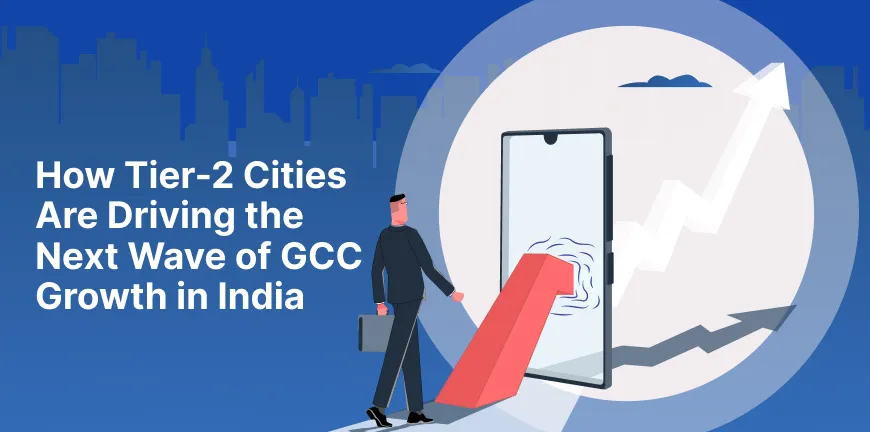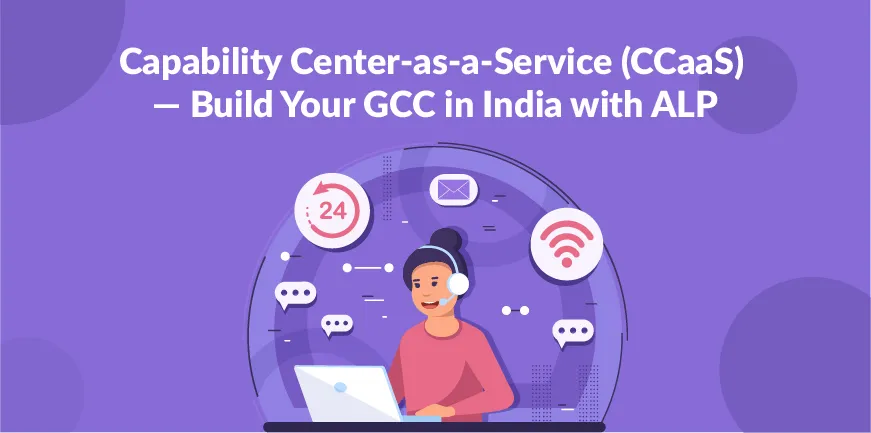
Top 7 Emerging Technologies Powering the Next-Gen GCCs
14/11/2025
Statutory Compliance Checklist – Updated
14/11/2025- The Evolving GCC Landscape in India
- Which are the Key Tier-2 Cities Powering GCC Expansion?
- Here are 5 ways the government is supporting GCC growth in Tier-2 cities:
- How to Set Up GCC Centres in Tier 2 Cities?
- What are the Benefits of Establishing GCCs in Tier-2 Cities?
- What are the Trends Establishing Tier-2 Cities as Epicentres of GCCs?
- How Alp Consulting Helps Companies Set Up GCCs in Tier 2 Cities?
- Key Takeaways
- FAQs
“The proposed framework for expanding GCCs into tier-2 cities marks a strategic pivot in the country’s tech evolution.”- Lalit Ahuja (CEO, ANSR).
Are you looking to set up a GCC in a Tier-2 city? Is Tier-2 GCC more viable than Tier-1?
India’s Tier-2 cities are fast emerging as the new frontier for Global Capability Centers (GCCs). With improved infrastructure, skilled talent, & government-backed incentives, companies are increasingly shifting focus beyond traditional Tier-1 hubs. Moreover, cities like Coimbatore, Pune, and Chandigarh are becoming hotspots for innovation & cost-efficient operations. Let’s explore how Tier-2 cities are driving the next wave of GCC growth in India.
The Evolving GCC Landscape in India
Global Capability Centers (GCCs) are reshaping India’s business ecosystem, evolving from mere budget-saving units to innovation-driven powerhouses. This statement is boosted by the fact that the GCC market size growth is projected to rise from $64.6 billion (FY2024) to a whopping $99–$105 billion by 2030. Also, 70% of Fortune 500 companies are projected to expand their GCC presence in India by 2030.
With world-class infrastructure, digital transformation, & a strong talent pool, India has become the preferred global hub for GCC setups. The increasing focus on Tier-2 cities is expanding this growth beyond metros, enabling distributed innovation, cost efficiency, & localized development. This unprecedented growth of GCCs across Tier-1 & Tier-2 cities positions India as a global leader in knowledge-driven operations, R&D, & technology excellence, attracting MNCs to establish & scale their GCC presence across the nation.
The Shift Beyond Metros: Why Tier-2 Cities Matter for GCCs Setup?
Here are 5 reasons that make Tier-2 cities paramount for future GCC setups:
1. Cost Efficiency and Lower Infrastructure Expenses
Tier-2 cities like Pune, Ahmedabad, & Mysore offer affordable real estate, utilities, & operations, helping companies optimize GCC setup costs without compromising productivity or quality standards. Tier-2 cities typically offer a 10% to 35% lower TCO (Total Cost of Operations) compared to the Tier-1 centres (e.g., Mysore vs. Bangalore). Moreover, over 200 GCCs have already created demand for more than Rs. 30,000 crore worth of commercial real estate in Tier-2 & Tier-3 cities.
2. Access to Skilled and Emerging Talent Pools
Tier-2 cities have a growing base of educated professionals from regional universities, offering diverse technical, analytical, & operational expertise for GCCs. Over 60% of India’s graduates (especially in engineering & technology) arise from non-metro cities, representing a massive and untapped workforce.
3. Improved Quality of Life and Lower Attrition Rates
Lower living costs & better work-life balance attract and retain skilled employees, reducing turnover and improving long-term workforce stability. Employee turnover rates in Tier-2 cities have been observed to be 10% to 15% lower than the high average attrition rates seen in Tier-1 locations (which hovers around 15.2%)
4. Government Support and Incentive Programs
Tier-2 cities benefit from state-led IT policies, tax incentives, & infrastructural investments, encouraging multinational companies to establish GCC operations locally. Example: Karnataka’s GCC Policy (2024-2029) aims to attract 500 new GCCs in the next 5 years, focusing on expansion outside of Bengaluru with incentives like rental reimbursements & skilling expense funding.
5. Enhanced Infrastructure and Connectivity
Modern transport systems, tech parks, & digital connectivity make Tier-2 cities well-suited for global business operations and 24/7 service delivery. For instance, Tier-2 cities like Bhubaneshwar & Jaipur have consistently been ranked among the top 5 in terms of mobility infrastructure and road networks, sometimes overshadowing established metros.
Which are the Key Tier-2 Cities Powering GCC Expansion?
Here are the top 5 Tier-2 Cities Powering GCC Expansion
1. Pune
A thriving IT ecosystem, skilled workforce, and strong educational institutions make Pune an attractive destination for technology-driven GCC setups. Currently, Pune hosts over 360 operational GCCs, making it a highly mature Tier-2 hub, with strong representation in BFSI (30%), Manufacturing (26%), & Technology (21%). Also, this rapidly growing city is getting ready to host over 500 GCCs by 2030 due to its specialized talent ecosystem.
2. Coimbatore
Known for its industrial base, engineering talent, and startup ecosystem, Coimbatore offers the perfect blend of affordability and skilled manpower. Coimbatore witnessed a 21% CAGR rise in new GCC setups over the past 5 years, nearly outpacing most Tier-1 hubs.
3. Chandigarh
Excellent infrastructure, government support, and high literacy rates make Chandigarh a promising emerging hub for GCC operations. Chandigarh has a high literacy rate & access to a fresh, less-contested talent pool, contributing to lower attrition rates (usually 10–15% lower than metros).
4. Ahmedabad
With its strong manufacturing base, talent availability, & improving connectivity, Ahmedabad is becoming a preferred GCC location for a large number of global enterprises. Currently, Gujarat’s GCC Policy (2025-30), with Ahmedabad being at the centre, aims to attract a minimum of 250 new GCC units and create over 50,000 jobs, backed by targeted incentives.
5. Visakhapatnam
The city’s port connectivity, tech infrastructure, & focus on sustainable development make it a rising star for GCC investments in southern India. Global tech giants are earmarking massive investments, such as Google’s subsidiary Raiden Infotech’s $15 billion for a 1 GW AI hub & data-centre cluster in Visakhapatnam.
What is the Government’s Contribution Towards GCC Growth in Tier-2 Cities?
Here are 5 ways the government is supporting GCC growth in Tier-2 cities:
1. Infrastructure Development Initiatives
The state governments are making investments in IT parks, smart cities, & digital infrastructure to strengthen Tier-2 cities’ readiness for global business operations. Approximately 25% of new GCC setups in India over the past 3 years have been in Tier-2 cities. Additionally, GCC leasing in Tier-2 cities has nearly increased two folds in FY2025, with the share surging from 7% in FY2024 to 15–20% in FY2025.
2. Tax Incentives and Subsidies
State governments offer tax relief, grants, and power subsidies to attract foreign investment & corporate expansion. Example: Tamil Nadu government is offering an additional capital subsidy of 10% and 25% for new or expanding IT/ITeS industries located in certain districts over the eligible limit.
3. Skill Development and Education Programs
The government is collaborating with educational institutions to enhance workforce readiness, aligning academic programs with GCC talent needs. Tier-2 GCCs reported a 21% year-over-year (YoY) growth in hiring in 2025, significantly outpacing the 11% growth observed in metro cities.
4. Single-Window Clearance Systems
The government’s simplified approval processes help companies quickly obtain the necessary licenses & permissions for GCC establishment. Example: Karnataka’s GCC policy is targeting to process all necessary operational approvals for a new GCC setup within 45 days via a single-window clearance system.
5. Public-Private Partnership Initiatives
Collaborations between government & industry ensure long-term infrastructure, policy, & resource support for sustainable GCC growth. Example: The Gujarat GCC Policy (2025-30), which relies extensively on PPP to make the state a GCC hub, aims to attract an investment of ₹10,000 crore & generate more than 50,000 jobs directly via new GCC units.
How to Set Up GCC Centres in Tier 2 Cities?
Here are 7 key steps involved in setting up GCCs in Tier-2 cities:
1. Conduct Feasibility & Market Analysis
Evaluate cost, talent availability, infrastructure, & regulatory landscape to narrow down the most suitable Tier-2 location for GCC setup.
2. Select the Right City and Business Model
Choose a location aligned with business objectives, considering technology focus, scalability, & long-term operational sustainability.
3. Partner with Local Experts and Consultants
Engage reputed GCC setup partners like Alp Consulting with regional experience to navigate legal, HR, & compliance requirements efficiently.
4. Obtain Regulatory Approvals and Clearances
Secure licenses, tax registrations, and operational permits via local authorities or single-window systems.
5. Set Up Infrastructure and Digital Frameworks
Establish offices, IT systems, & security measures to support remote collaboration & global communication standards.
6. Hire and Train the Workforce
Recruit local talent via universities & training programs to ensure alignment with organizational goals and skill needs.
7. Implement Governance and Performance Frameworks
Establish processes for compliance, performance tracking, & innovation to maintain quality and operational excellence.
What are the Benefits of Establishing GCCs in Tier-2 Cities?
Here are 5 key benefits of setting up GCCs in Tier-2 cities:
1. Cost-Effective Operations
Lower rentals, salaries, and utilities reduce overall operational expenses in Tier-2 cities without affecting productivity or innovation capacity. Example: Office space rentals in Tier-2 areas like Kochi or Indore can be 40–60% lower than in Tier-1 cities like Bangalore and Chennai.
2. Access to Untapped Talent Markets
Tier-2 cities provide a young, dynamic workforce with diverse skills across technology, analytics, & customer operations. Example: Tier-2 hubs like Jaipur, Coimbatore, & Kochi collectively boast a tech talent pool of nearly 490,000–540,000.
3. Lower Attrition and Better Retention Rates
Employees in Tier-2 cities often prefer local opportunities, ensuring workforce stability & long-term retention. Example: Working professionals in Tier-2 cities often report commute times under 25 minutes, freeing up significant personal time compared to Tier-1 metros.
4. Decongestion of Metro Hubs
Expanding into Tier-2 cities reduces urban pressure while enabling distributed and resilient business operations. Approximately 28% of new GCCs set up in India in the most recent fiscal year (2024) were established in Tier-2 cities.
5. Enhanced Business Continuity and Scalability
Geographic diversification offers flexibility to scale operations while minimizing risks from regional disruptions or talent shortages. Example: 95% of leading global enterprises prioritize geographic diversification for their GCCs to insulate operations from regional disruptions (e.g., strikes, infrastructure outages, or localized cost spikes).
What are the Trends Establishing Tier-2 Cities as Epicentres of GCCs?
Here are 5 key trends establishing Tier-2 cities as the epicentres of GCCs:
1. Hybrid and Distributed Work Models
The post-pandemic shift toward hybrid & remote work encourages companies to expand GCC footprints into cost-efficient Tier-2 regions. Nearly 78% of new GCC roles are now designed for hybrid work, making the geographic location of the employee less restrictive & enabling expansion into Tier-2 cities.
2. Focus on Digital Transformation and Automation
GCCs in Tier-2 cities increasingly handle RPA, AI, & analytics functions, driving innovation beyond traditional back-office work. Approximately 70% of GCCs in India are actively investing in Generative AI (GenAI) use cases, a trend mirrored in their expansion sites to drive digital transformation globally.
3. Collaborations with Educational Institutions
Partnerships with local universities foster skill development, internships, & talent pipelines aligned with global business requirements. Over 60% of India’s engineering graduates annually emerge from Tier-2 and Tier-3 cities, making these locations vital for sustained talent supply.
4. Emergence of Sector-Specific Clusters
Cities are evolving into domain-focused clusters like FinTech, HealthTech, or Manufacturing GCCs, enhancing specialization and operational excellence. Example: a Tier-2 city like Coimbatore is home to more than 25 GCCs, leveraging the city’s strong engineering education base.
5. Government-Backed Smart City Programs
Smart city initiatives improve connectivity, urban planning, and infrastructure, making Tier-2 cities more investment-friendly for GCC operations. Example: The Smart Cities Mission by the central government has accomplished over 7,380 projects with a total investment exceeding Rs. 1,47,704 crores (approx. $17.7B), directly boosting connectivity & utility services in more than 100 non-metropolitan cities.
How Alp Consulting Helps Companies Set Up GCCs in Tier 2 Cities?
Alp Consulting, a leading GCC implementation centre in India, offers end-to-end support for global enterprises establishing GCCs in Tier-2 Indian cities. From market research and location assessment to talent acquisition, payroll, compliance management, IT, etc., ALP ensures smooth setup and sustainable operations.
With deep local expertise and a pan-India presence, we simplify regulatory processes, optimize HR frameworks, & build scalable workforce strategies. By partnering with us, companies can confidently expand into emerging Tier-2 hubs, achieving faster setup, operational efficiency, & long-term business success.
Key Takeaways
- Tier-2 cities are emerging as cost-efficient, innovation-driven hubs for next-generation GCC expansion.
- Government incentives and improved infrastructure are accelerating GCC growth beyond traditional Tier-1 metros.
- Skilled, affordable talent from regional universities fuels sustainable and scalable GCC operations.
- Strategic diversification into Tier-2 cities ensures lower attrition, better retention, and business continuity.
- Consulting partners like Alp Consulting simplify GCC setup through expertise in compliance, HR, and local integration.
FAQs
1. Why are Tier-2 cities becoming attractive for GCC expansion in India?
Tier-2 cities offer cost savings, a skilled workforce, government incentives, and improved infrastructure, ideal for global business operations.
2. Which Tier-2 cities show the most potential for future GCC investments?
Pune, Coimbatore, Ahmedabad, Chandigarh, & Visakhapatnam demonstrate strong infrastructure, talent availability, & business-friendly policies.
3. How do Tier-2 cities compare with Tier-1 cities in terms of talent availability?
Tier-2 cities provide abundant, emerging talent from reputed regional universities at competitive hiring costs.
4. What are the main challenges of setting up GCCs in Tier-2 locations?
Limited infrastructure, slower regulatory processes, and talent retention are key GCC setup challenges in Tier-2 cities.
5. How can consulting partners help global enterprises establish GCCs in Tier-2 cities?
A top GCC implementation partner, like Alp Consulting, manages location strategy, hiring, compliance, & setup processes, ensuring seamless operations and sustainable growth.

Kishore V N
Kishore V N is the Managing Director at ALP Consulting, bringing over 29 years of extensive experience in global recruitment, talent strategy, and workforce solutions. He has been instrumental in building scalable RPO, MSP, and modular talent sourcing models that empower organizations with a competitive edge in talent acquisition. Kishore’s leadership focuses on expanding ALP’s global presence, driving innovation in recruitment technology, and enhancing operational excellence. He also serves as Director at Datacore Technologies, steering digital HR transformation through advanced HRMS and virtual staffing solutions.




